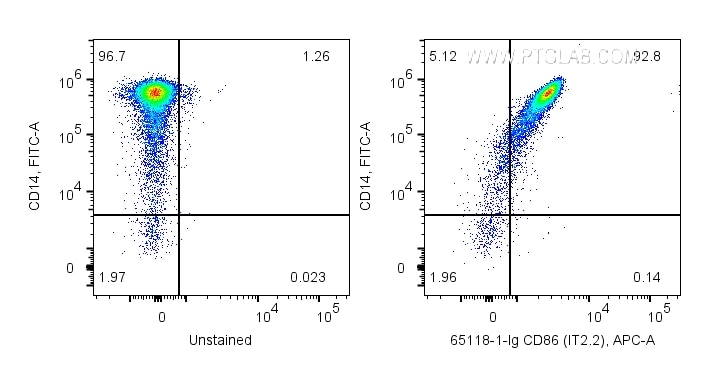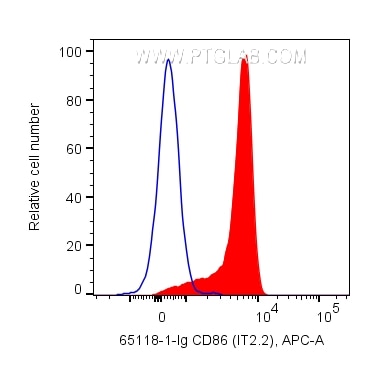Anticorps Monoclonal anti-CD86
CD86 Monoclonal Antibody for FC
Hôte / Isotype
Mouse / IgG2b, kappa
Réactivité testée
Humain
Applications
FC
Conjugaison
Non conjugué
CloneNo.
IT2.2
N° de cat : 65118-1-Ig
Synonymes
Galerie de données de validation
Applications testées
| Résultats positifs en cytométrie | CMSP humaines, |
Dilution recommandée
| Application | Dilution |
|---|---|
| This reagent has been tested for flow cytometric analysis. It is recommended that this reagent should be titrated in each testing system to obtain optimal results. | |
| Sample-dependent, check data in validation data gallery | |
Informations sur le produit
65118-1-Ig cible CD86 dans les applications de FC et montre une réactivité avec des échantillons Humain
| Réactivité | Humain |
| Hôte / Isotype | Mouse / IgG2b, kappa |
| Clonalité | Monoclonal |
| Type | Anticorps |
| Immunogène | s/o |
| Nom complet | CD86 molecule |
| Masse moléculaire calculée | 329 aa, 38 kDa |
| Numéro d’acquisition GenBank | BC040261 |
| Symbole du gène | CD86 |
| Identification du gène (NCBI) | 942 |
| Conjugaison | Non conjugué |
| Forme | Liquide |
| Méthode de purification | Purification par protéine A |
| Tampon de stockage | PBS with 0.09% sodium azide |
| Conditions de stockage | Store at 2-8°C. Stable for one year after shipment. |
Informations générales
CD86 (also known as B7-2) is a costimulatory molecule belonging to the immunoglobulin superfamily. Primarily expressed on antigen-presenting cells (APCs), including B cells, dendritic cells, and macrophages, CD86 is the ligand for two proteins at the cell surface of T cells, CD28 antigen and CTLA-4. Binding of CD86 with CD28 antigen is a costimulatory signal for activation of the T-cell. Binding of CD86 with CTLA-4 negatively regulates T-cell activation and diminishes the immune response. (PMID: 7513726; 1847722; 11029388; 27591335)
Protocole
| Product Specific Protocols | |
|---|---|
| FC protocol for CD86 antibody 65118-1-Ig | Download protocol |
| Standard Protocols | |
|---|---|
| Click here to view our Standard Protocols |



